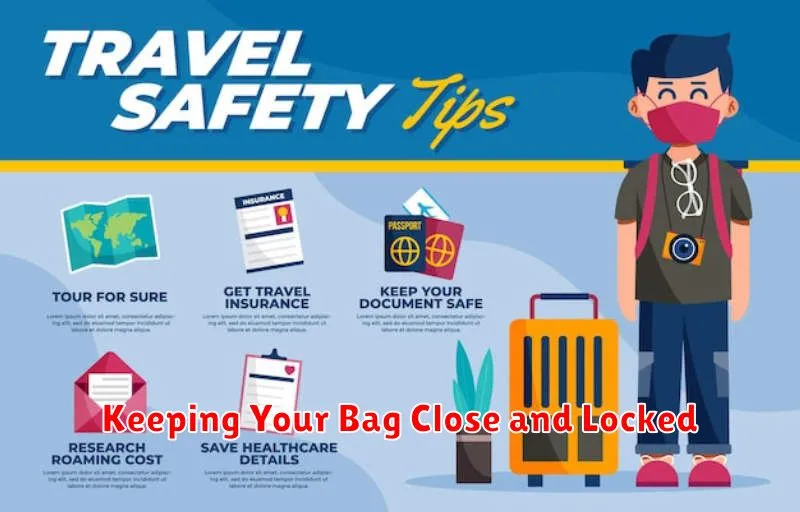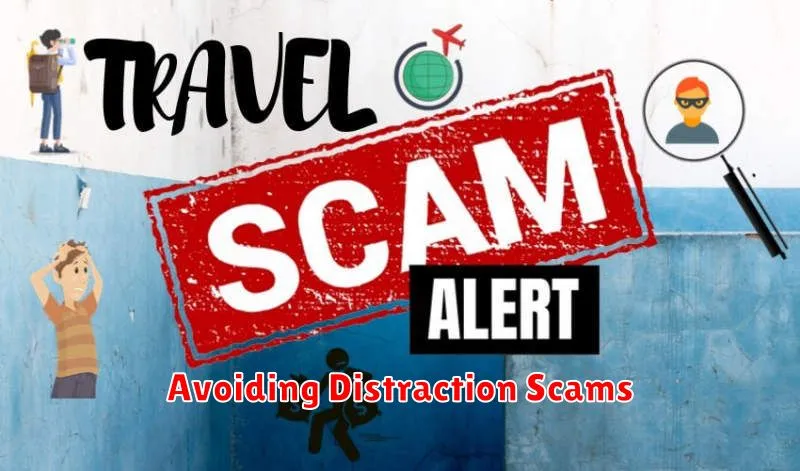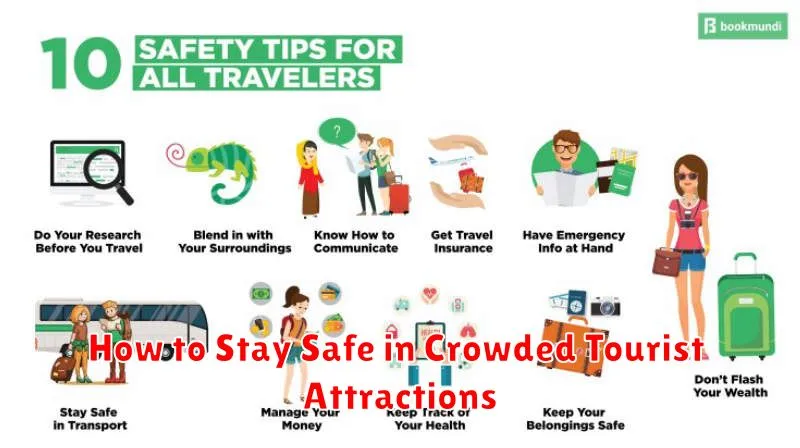Traveling to crowded tourist attractions can be an exciting experience, but ensuring your safety is paramount. This article provides essential tips and strategies to help you navigate crowded destinations while prioritizing your personal safety. From pickpocketing and theft to crowd crushes and getting lost, we’ll cover the key concerns and offer practical advice on how to stay safe. Learn how to prepare for crowded environments, protect your belongings, and react effectively in unexpected situations at tourist attractions.
Whether you’re visiting a bustling market, a famous landmark, or a popular festival, understanding the potential safety risks is crucial. This guide will equip you with the knowledge and tools to stay safe while enjoying the vibrant atmosphere of crowded tourist attractions. Discover simple yet effective measures you can take to minimize risks, from pre-trip planning to on-the-ground awareness, ensuring a worry-free and memorable travel experience. Learn how to stay safe in crowded places and focus on enjoying the sights, sounds, and experiences of your chosen destination.
Understanding the Risks in Crowded Places
Crowded places, while often vibrant and exciting, present unique safety and security challenges. Increased density makes it more difficult to navigate, potentially hindering swift exits in emergencies. The close proximity of individuals also elevates the risk of transmission of contagious illnesses, especially airborne ones. Furthermore, crowded environments can be targets for criminal activity like theft, assault, and acts of terrorism due to the anonymity they offer and the large number of potential victims.
Being aware of your surroundings is crucial in mitigating risks. Maintain situational awareness by observing the people around you and identifying potential exits. Keep your belongings secure and close to you, minimizing opportunities for theft. If you feel uncomfortable or sense a potential threat, trust your instincts and move to a safer location.
Planning ahead can significantly improve your safety in crowded spaces. Research the location beforehand, noting exits and potential hazards. Inform someone of your plans, including your expected arrival and departure times. Consider traveling with a companion for added security and support. Finally, in the event of an emergency, follow the instructions of security personnel and move calmly and purposefully towards the nearest exit.
Spotting Pickpocket Behavior Early
Pickpockets often exhibit subtle behaviors that can give them away. Excessive body contact, especially in crowded areas, is a major red flag. They might bump into you repeatedly, seemingly by accident, or brush against you more than is normal. Unusual hand movements are another telltale sign. Watch for hands that seem to linger near pockets, purses, or backpacks, especially if they don’t belong to the person carrying them. Also, be wary of individuals who appear overly helpful or distracting, such as someone offering unsolicited directions or assistance.
Another common tactic pickpockets use is working in teams. One person might create a diversion, like staging a fake argument or spilling something, while another team member lifts your valuables during the commotion. Pay attention to groups who seem to be coordinating their actions or moving in a suspicious manner. Be extra cautious in tourist hotspots and crowded transportation hubs, as these are prime locations for pickpocketing activity.
While being aware of these behaviors is crucial, the best defense against pickpockets is proactive prevention. Keep valuables secured in zipped pockets or bags close to your body. Avoid displaying large amounts of cash or expensive jewelry. Be especially vigilant in crowded areas and maintain awareness of your surroundings. By taking these precautions and being observant, you can significantly reduce your risk of becoming a victim.
Keeping Your Bag Close and Locked

Protecting your belongings is crucial, especially when traveling or in crowded areas. Keeping your bag close and locked significantly reduces the risk of theft. A closed bag presents a smaller target and makes it harder for pickpockets to access your valuables quickly. Adding a lock, even a simple combination lock, provides an extra layer of security and deters opportunistic thieves.
There are various ways to keep your bag close. Consider wearing a cross-body bag or keeping your backpack in front of you in crowded environments. When seated, keep your bag on your lap or looped around your leg. Never leave your bag unattended, even for a short period. Being attentive to your surroundings and keeping your bag within your sight is one of the most effective deterrents.
Investing in a theft-resistant bag with features such as slash-proof straps and locking zippers can offer added protection. Regularly check that your bag is securely closed and locked. Remember, taking these simple precautions can greatly reduce the chances of becoming a victim of theft and contribute to a safer, more enjoyable experience.
Avoiding Tourist Traps and Fake Tickets
Research is key to avoiding tourist traps. Before your trip, explore reputable travel blogs, forums, and guidebooks. Identify must-see attractions and compare prices from different sources. Look for local recommendations and off-the-beaten-path experiences. Be wary of overly-hyped attractions or deals that seem too good to be true. Understanding the true value of experiences helps you avoid inflated prices and disappointing tourist traps.
Purchasing tickets from official vendors is the best way to avoid fake tickets. The official website of the attraction, recognized ticket agencies, or the venue’s box office are usually safe bets. Avoid buying tickets from street vendors or unofficial resellers, as these tickets are often counterfeit. Confirm ticket authenticity by checking for security features like holograms or barcodes. Read reviews of ticket sellers online to ensure their legitimacy before purchasing. Protecting yourself from scams ensures a smooth and enjoyable experience.
Staying informed and using common sense will further protect you. Be cautious of overly-aggressive salespeople or tour guides. If a deal feels suspicious, it probably is. Negotiate prices respectfully, but be prepared to walk away if something doesn’t feel right. Trust your instincts and prioritize reputable sources for information and tickets. A little caution goes a long way in ensuring a memorable and authentic travel experience.
Knowing Emergency Exits and Gathering Points
In any emergency situation, knowing the locations of emergency exits and designated gathering points is crucial for ensuring your safety and the safety of others. Familiarize yourself with the floor plans of your building, paying particular attention to the highlighted escape routes and exit doors. Understanding these routes can save valuable time in an emergency, allowing for a swift and organized evacuation.
Gathering points are predetermined safe locations outside of the building where people should assemble after evacuating. These points allow for accountability and facilitate communication with emergency responders. Knowing where to go after exiting the building can prevent confusion and help maintain order in a potentially chaotic situation. Be sure to locate the designated gathering point for your area and make a mental note of its location relative to the building.
Regularly reviewing emergency procedures and the locations of exits and gathering points is essential. Practice drills can reinforce this knowledge and improve response times in a real emergency. Take the time to understand your building’s safety protocols, and don’t hesitate to ask questions if anything is unclear.
Avoiding Distraction Scams

Distraction scams rely on diverting your attention while an accomplice steals your belongings. These scams often involve multiple people working together, one creating a distraction while the other commits the theft. Common tactics include asking for directions, feigning an accident, or dropping money in front of you. Be extra vigilant in crowded places and situations where strangers approach you unexpectedly. If you feel uneasy, politely excuse yourself and move to a safer location.
Protect yourself by being aware of your surroundings and maintaining control of your personal belongings. Keep valuables like wallets and phones secured and out of easy reach. If someone bumps into you or tries to engage you in a confusing or overly persistent manner, be suspicious. Don’t be afraid to ignore unsolicited requests for help or information, especially if they seem unusual or designed to draw your attention away from your possessions.
If you believe you’ve been targeted by a distraction scam, report it to the police immediately. Provide as much detail as possible, including descriptions of the individuals involved and the sequence of events. By raising awareness and reporting these incidents, you can help prevent others from becoming victims.
Staying Calm During Panic Situations
Panic can be debilitating, but learning to manage it is crucial for navigating challenging situations. Recognize the onset of panic: awareness of your physical and mental symptoms (rapid heartbeat, shortness of breath, racing thoughts) is the first step. Then, control your breathing. Slow, deep breaths can regulate your heart rate and calm your nervous system. Focus on inhaling deeply through your nose and exhaling slowly through your mouth.
Grounding techniques can help bring you back to the present moment and reduce feelings of overwhelm. This might involve focusing on your senses: What do you see, hear, smell, taste, and touch? Another helpful technique is to mentally list things you know to be true, such as your name, your location, and the current date. Challenging negative thoughts is also important. Ask yourself if your fears are based on facts or assumptions. Often, panic arises from exaggerated or unrealistic perceptions of danger.
If you find yourself struggling with panic regularly, seeking professional help is recommended. A therapist can teach you coping mechanisms and strategies for managing anxiety long-term. Remember, managing panic is a skill that can be learned and strengthened with practice.

